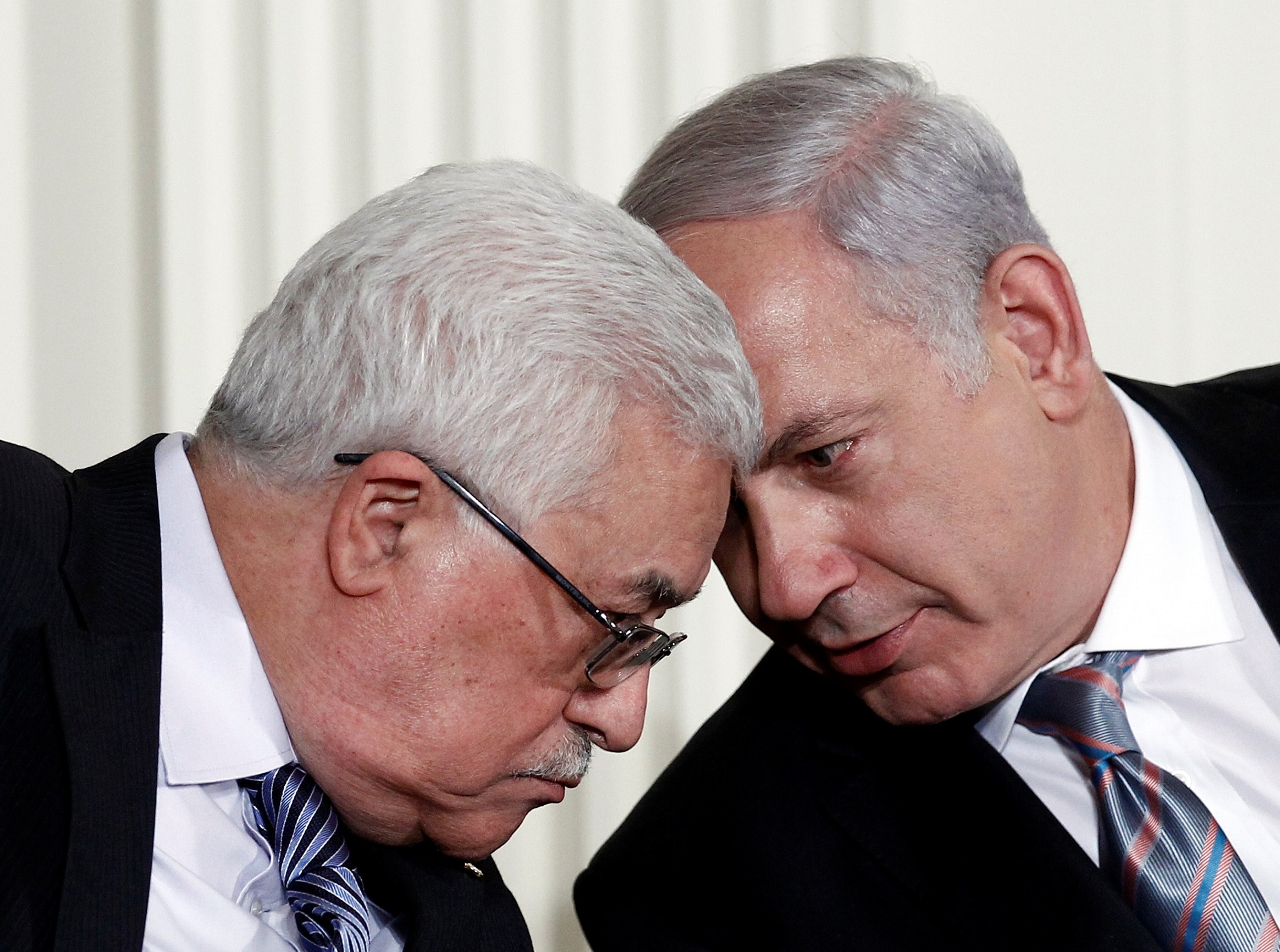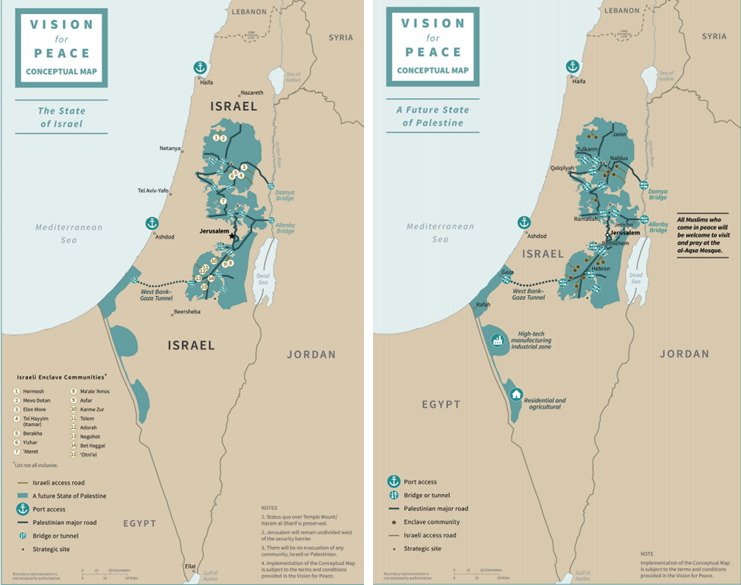Publications
INSS Insight No. 1267, March 3, 2020

Over recent months both Israel and the Palestinians have recorded significant strategic achievements in the prolonged struggle between them. The leaders of both sides told their nations that these victories moved them closer to their desired aim – a resolution to the conflict that fulfills their national desires. However, a critical examination of these achievements raises doubts about the extent to which they actually advance the stated aims of the two sides. The Israeli demand to implement immediately some portions of the Trump plan, and the Palestinian refusal to relate to it as a basis for negotiation, increase the need for negotiated interim solutions that preserve the possibility for a negotiated solution to the conflict.
Over recent months both Israel and the Palestinians have recorded significant strategic achievements in the prolonged struggle between them. The leaders of both sides told their nations that these victories moved them closer to their desired aim – a resolution to the conflict that fulfills their national desires. However, a critical examination of these achievements raises doubts about the extent to which they actually advance the stated aims of the two sides. In practice, the “achievements” distance Israel and the Palestinians from renewing direct and constructive negotiations between them. They further the illusion and the false hope that their actions in the present foster success, thus causing both sides to dig their heels in deeper.
Chronologically, the first in a series of recent Palestinian successes was a resolution by the UN Committee on the Elimination of Racial Discrimination (a committee of 18 independent experts, established by the 1965 Convention on the Elimination of All Forms of Racial Discrimination) on December 12, 2019, whereby it has jurisdiction to hear a complaint by the "State of Palestine" against Israel. This ruling defied the objection of Israel and additional countries. Their opposition mainly related to the status of "Palestine" as a state that is party to an international convention. In the framework of the strategic decision by the Palestinian leadership to devote most of its diplomatic attention to attacks on Israel in the international arena and establishment of its own status as a state in every international forum, it can see this resolution as an achievement.
On December 20, 2019, the Prosecutor of the International Criminal Court (ICC) in The Hague announced that crimes have been and are being carried out in the West Bank, East Jerusalem, and the Gaza Strip. At the same time, the Prosecutor requested a legal opinion whether the ICC has jurisdiction over these areas. This case is likewise a clear achievement for the Palestinians, although there is also the possibility that Palestinian crimes could be ruled on by the Court. If it is ruled that the Court can hear charges against Israel, Israeli ministers and military and security officials could be summoned to testify and be judged in the Court; arrest warrants might be issued for them if they refuse to appear, and a long series of legal and political struggles might ensue. It may be that ultimately not a single Israeli will stand trial, but the political-legal fight in the ICC will be the backdrop of negotiations between the sides, if and when they resume.
The third in the series of Palestinian achievements was the publication of initial information about commercial entities working in West Bank settlements and in East Jerusalem. The report, which includes the names of 112 entities (mostly Israeli), was published by the UN High Commissioner for Human Rights on February 12, 2020, after prolonged Israeli efforts to prevent its publication. The Palestinian attempt to promote an economic boycott of the settlements has borne little fruit thus far, but the involvement of a significant international agency in this attempt (albeit one known for its problematic and biased composition and activity) encourages boycott efforts, and has potential negative consequences beyond the settlements, on Israel proper.
(the publication of initial information about commercial entities working in West Bank settlements and in East Jerusalem)
On the other side of the balance sheet, President Donald Trump's initiative for resolving the Israeli-Palestinian conflict appears to be a historic and unprecedented Israeli accomplishment. From the start of direct negotiations between Israel and the Palestinians, the Palestinians have managed to impart to the international community their version of the solution – a Palestinian state on the basis of 1967 borders, minor land swaps on a 1:1 ratio, East Jerusalem as their capital, and a "just and agreed-upon" solution to the Palestinian refugee problem. This stance was adopted not only by the Arab League (in 2002 and again in 2007) but indirectly by the Quartet on the Middle East – the international forum that includes the US, the EU, Russia, and the UN – given that the Arab League's resolution was mentioned as one of the sources of the Quartet's 2003 initiative for solving the conflict. The US, the sole international party that both sides agreed to involve directly in previous rounds of negotiations, remained faithful to the stance first formulated by then-Secretary of State William Rogers in 1969, whereby the 1967 lines with "minor modifications" are the outline for solving the territorial issue in the Arab-Israeli conflict. None of the American formulations in the context of this issue, from the 2000 Clinton Parameters and the 2004 President George W. Bush letter to Prime Minister Ariel Sharon, to the words of President Trump himself when he explained the US recognition of Jerusalem as Israel's capital and the subsequent move of the US embassy from Tel Aviv to Jerusalem, deviated from the Rogers declaration.
The Trump plan thus constitutes a dramatic turning point regarding the US approach to an Israeli-Palestinian agreement, and creates, at least temporarily, a different basis for the international discourse on the conflict. In light of the minor impact of Palestinian achievements, the lukewarm criticism by Arab and other states of Trump's plan seems like an earthquake, which upsets the basis of many years of international support for Palestinian demands. The fissures in the intra-Arab narrative in the context of the Israeli-Palestinian conflict became visible from the moment the Trump administration began working on the formulation of a solution, and widened after the US recognized Jerusalem as Israel's capital and moved its embassy there, as well as cancelling financial support for UNRWA and the Palestinians, and closing the PLO's Washington office. The response by Arab states, not only those considered allies of the US, was low key. President Trump's plan includes transferring one third of the territories in the West Bank to Israel (compensated by swaps of smaller areas elsewhere), leaving the current situation in Jerusalem as is, and a solution to the refugee problem that makes no reference to “return.” When President Trump, in the presence of Israeli Prime Minister Benjamin Netanyahu, presented this plan, ambassadors of three Arab states sat in the room at the White House. The Palestinian issue is no longer at the top of the intra-Arab agenda after a decade of civil wars, in which hundreds of thousands were killed, millions became refugees, and states crumbled. In this context, the Arab League decision to fully support Palestinian rejection of the Trump plan was mere cold comfort for the Palestinians.
Thus far, the response from Europe to the Trump plan has been a whimper, and an official EU position has not been presented. Josep Burell, the EU High Representative for Foreign Affairs and Security Policy, responded in a restrained fashion, and later said that if Israel takes unilateral steps (i.e., annexation), the EU will have no choice but to respond. In a meeting of European foreign ministers some three weeks after Trump presented his plan, the ministers preferred to discuss the establishment of a military force to oversee the weapons embargo on Libya and not the Palestinian issue; they postponed the discussion on this issue to their next meeting. In meetings with European leaders including Chancellor Angela Merkel, Abu Mazen heard promises of support for the two-state solution. German Minister of Foreign Affairs Heiko Maas, referring to the Trump plan, said that it "raises questions." In contrast, his British colleague Dominic Raab called it "a serious proposal." At the same time, no senior European politician expressed support for the proposal, although none emphatically renounced it. When Abu Mazen addressed a UN Security Council meeting, the Palestinians failed resoundingly to enlist 9 out of 15 members states to vote for the their position, which condemns and rejects the Trump plan, and the US did not need to exercise its veto power.

For the camp in Israel that rejects the idea of two states for two peoples in the space between the Jordan River and the Mediterranean Sea as a guiding principle for conflict resolution, the Trump plan is a twofold success. On the one hand it recognizes the Jewish people's historic rights to the land of Israel, and on the other distances the Palestinians from the negotiating table and thus diminishes the possibility of a Palestinian state recognized by Israel. This camp's demand to immediately establish facts on the ground, and to decrease the area slated in the Trump plan to be taken away from Israel, has been put on hold for now by the US administration. It appears like the administration itself reconsidered, after several days during which various administration representatives left an opening for an interpretation whereby Israel can act immediately in areas slated to remain under its sovereignty. This interpretation was based on complete disregard for the actual written plan, in which it is repeatedly emphasized that the proposal is meant to be a basis for an agreement between the two sides. It may also be that the US administration and some parties in the current Israeli government stopped to think about the potential consequences of unilateral Israeli steps for the chances for a negotiated resolution of the Israeli-Palestinian conflict, and the Arab and international response to Israeli moves in this direction. On the other hand, an Israeli government that might engage in negotiations in the future will presumably face significant public pressure in Israel to adopt positions similar to those in the plan proposed by the Trump administration. The Palestinian positions, which have undergone only minor changes since the beginning of permanent status negotiations between the sides, lead to an unequivocal conclusion: the Palestinian side will not view the Trump proposal as a basis for negotiations. The failure of any future negotiations about the core issues of the conflict ꟷ and potentially the failure to even attempt negotiations ꟷ is thus likely.
Although the architects of the Trump plan did not intend it, the potential side effects of presenting the plan – Israeli demands and pressure to implement portions of the plan immediately, and Palestinian refusal to accept it as a basis for negotiations – increase the need for negotiated interim solutions that will preserve what is essentially the sole possibility for a negotiated resolution to the conflict – two states for two peoples between the river and the sea. If the two sides adopt this approach, they will be able to bypass hurdles in the initial stages of the negotiations that would require them, for example, to draft the final borders or the status of East Jerusalem. They will not be able to avoid these key issues in the long term, but in the early stages of such a process they may be able to create positive momentum, different from the typical current dynamic around core issues of dispute between them.


